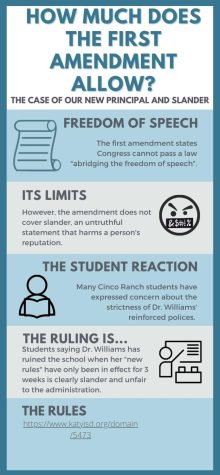Exemption policy must change
Current System leaves students with few choices
The current exemption policy needs amendments in regards to absences and extenuating circumstances. There are positives of the exemption policy; it does encourage students to attend school, work hard to maintain high grades in classes, and behave appropriately in the classroom. However, the exemption policy also comes with negative effects; sick students still attend school, spreading their sickness to other healthy individuals, performing worse in classes and failing to get better. Students show up to school sick, feeling miserable, knowing even an excused absence will count against our exemptions.
Attendance and acceptable behavior should be expected from all students. Students behave appropriately, avoiding detentions, suspensions and other consequences to keep exemptions. Exemptions give the students a reason to not ditch because they want to exempt the finals of classes they have a borderline A, B or C grade. Absences both excused and unexcused count towards a student potentially losing their exemption. One student may lose their exemption because they ditched school too many times, giving them unexcused absences, and another student may lose their exemption because they had a doctor’s appointment they could not miss, giving them an excused absence. This policy is unfair to students with legitimate reasons to miss school. The argument is students and parents should schedule doctor’s appointments that don’t interfere with the students education, but in some cases, there are no other appointment options.
For example, I am 17 years old; for the most part, I need a guardian to be with me at my doctor’s appointments. After school doesn’t work for me because of two working parents, and my family expects me to be there for my sibling in case something happens, and my doctor’s office is not open during the weekends. Students who arrive to school with a doctor’s note excusing the absence should not have their absence count towards exemptions.
Students are not only penalized for attending a doctor’s appointment, but also penalized if legitimately sick. A student can bring a doctor’s note saying they had a fever of 101 and shouldn’t attend school, and still have that absence count against them. Getting sick is not a choice, Students do not choose to develop a fever overnight. Every student knows sickness counts against them. Students knowingly show up to school sick because they want to maintain their exemptions. Sick students come in contact with healthy students, causing an outbreak amongst the masses. More students contract the illness spreading around the school, but they also come to school sick, spreading the disease further. Sick students cannot absorb all the information in their classes, causing them to get low grades and bringing more stress onto the student.
During my sophomore year, I got pink eye. On the first day, I could hardly see because my eyes were so swollen. My mother drove me to Redi-Clinic, where I was diagnosed, and they told me I couldn’t go to school for the next 36 to 48 hours because pink eye is highly contagious and I could give it to everyone I came into contact with. They sent a message to my school, stating under no circumstances should I be around the other students, and my two absences got excused. Getting pink eye was out of my control, not being able to attend school was out of my control and getting my exemptions taken away was out of my control.
Another friend of mine later woke up and felt awful. She texted me that she had a fever, so I assumed she would not be at school that day. I was wrong. I walked up to my first period, and I saw her sitting outside in the hallway like everyday. I was shocked, to say at least.
“What are you doing here? Go home!” I demanded, keeping a safe distance. She simply glanced at me and said, “I can’t lose my exemptions. I have too many borderline classes.”
She didn’t go home, I didn’t rat her out and luckily, I didn’t get sick. Each situation shows both sides of the coin. There is no bright side concerning sick students: students miss school, get better, but lose exemptions, or students come to school miserable, endanger the health of other students, improve their health more slowly,, but keep exemptions.
Absences counting towards exemptions can be overturned, but the extenuating circumstances policy is generally unknown and nonsensical. I have searched and searched to find what qualifies as an extenuating circumstance, but have come up short. The Katy ISD website does not have much information on extenuating circumstances at all, let alone who qualifies. The website states:
“If you believe you have an extenuating circumstance and wish to apply for an exception of 1 to 2 additional absences, you can pick up an application in your grade level principals office. These forms are due to your grade level principal on or before Thursday, December 7th by 3 pm. No applications will be accepted after this date!”
I went to the 12th grade principal office to get one of the form and see the qualifications myself. I found the form, but the form does not say what is an extenuating circumstances, so I asked. I learned there is no set guidelines, all extenuating circumstances are reviewed by a committee. There are only a few absences guaranteed to be overturned: family deaths, surgeries, and cases where the students visited the emergency room.
During my junior year, a friend of mine possibly had breast cancer and multiple specialists met with her for tests. Many specialist assign appointments, so when told to go during school hours, there was no avoiding absences. Near exemption time, she filled out the extenuating circumstances form using the doctor’s reports and her appeal to overturn her absences was denied. She lost all of her exemptions and there was nothing she could do.
Promoting school and class participation through exemptions is great. Students should be expected to attend classes as well as maintain eligibility through grades. Exemptions are a privilege to be earned through hard work and commitment, but the policy needs to evolve. Students shouldn’t feel the need to come to school sick because they know they will receive a penalty for missing classes. Extenuating circumstances should apply for more situations than funerals, surgeries, and emergency room visits. No one should be penalized for sickness or maintaining their health. A student’s well-being should be top priority.

Rachel Foreman is a senior and a writer for County Line. During the day, she can be found goofing around in classes or talking with friends in the hallway....

![Tips for Studying Finals [INFOGRAPHIC]](https://crhscountyline.com/wp-content/uploads/2022/12/Studying-for-Finals-475x267.jpg)



Mason • Apr 24, 2018 at 11:18 am
I’m sick at school right now because of exemptions. Strep or something is going around and I’m sick at school getting other kids sick. This sucks and I need to pass chemistry and Spanish but I think I have too many absences already so rip